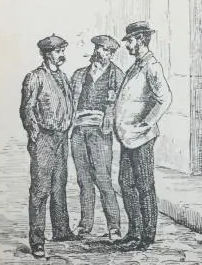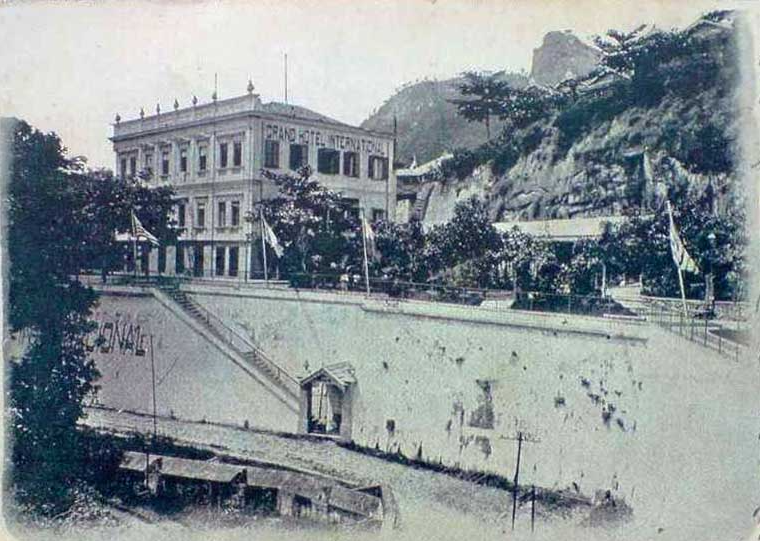61
Rio Janeiro
28th Nov. ‘92
My dear Mother,
I wrote you a short letter on board the “Thames” & on landing I sent a few lines to the Pater to let you know I had come so far.
Resuming. – The steamer entered port at about five in the afternoon but as it was raining heavily I postponed going ashore till next day. This morning I rose at five, had my tub & started with my small bags in the first boat that came off. The “Tagus” was lying near, so I went on board & knocked Bertie out of his bunk, spoke to him for a few minutes, & then proceeded.[1] He seems to like his trip very well. He goes today to Santos & will be back here on Sunday next. No sooner did our boat pull off (Youle was with me) than the rain came down in torrents, driven by a stiff head wind that sent the choppy seas over the side & made our progress a kind of crawl.[2] In spite of umbrella & overcoat I was soon wet through & I felt as if I were sitting in a pail full of water & mops. The Royal Mail steamers anchor far out in the Bay, & it took our boatman more than an hour to row ashore, against the head wind.

Two “changadores” – porters – shouldered my bags (the heavy luggage is sent straight from the steamer to the Custom house) & off we started for Mr Spann’s office near by. It was still closed, but luckily a few squares further on, just as I had decided to turn into a very shabby-looking hotel so as to get out of my wet clothes, I met Spann’s clerk who advised me to go on to Carson’s English Hotel.[3] A tram, or “bond” as they call them, took me there in a quarter of an hour & my porters turned up immediately after.[4] My first care was to strip & rub myself with a rough towel & then swall a stiff brandy & tonic. In these countries one must be careful not to let wet clothes dry on one. Fortunately my small hand-bag had proved water-tight & I had put pyjamas, soap, brushes & baccy into it – the prime necessaries – so I was soon clothed in my favorite robes enjoying my coffee & bread & butter & thereafter a pipe. My under garments, about the seat, had dyed a rich mauve shade – the wedding-garment-tint which I have hitherto affected in unspeak–aboutables but shall eschew in future.
My hat-box instead of retaining its original shape had become so {see sketch of pulpy hat below} & was decidedly pulpy on the top, but the glory of the silk tile inside was untarnished. My black bag, containing books, correspondence, & writing materials had leaked “considerable”, & these articles are now spread out to dry.

Bye & bye the clerk arrived with my mail, twenty-eight envelopes, containing say thirty-five letters! The answering of them ought to keep me out of mischief for some time to come. I read the private ones, finished an “urgent” letter to Dundee & sent the clerk back to post it for the “Thames”. By this time the waiter had brought back my clothes dried. He kindly offered to lend me a clean shirt of his own, which proposition I gratefully accepted. This is a republican country. I then had breakfast after which I felt sufficiently fortified to read the rest of my mail, & here we are!
Four “welcome weeklies” I found from you, 10th till 31st Oct. I am sorry for the old lady.[5] Her mind is so clear that she feels her helplessness the more.
Very glad to hear all the rest are well & lively. I hope you had an opportunity of dining Mr Murley Gotto for my acct.[6] I am very sorry they are not here just now. It is pleasant to read all your news about Belfast & Belfast people. The rain has cleared off now so I shall trot into town.
1st Dec. The day after writing the foregoing I came up to the “Hotel Internacional” at the head of a valley above the suburb of Santa Teresa, about 900 feet above the sea-level.[7] The surroundings are so exquisitely beautiful that they defy description. Behind us rises the precipitous peak of the Corcovado – “the hunchback”.[8] To the right the deep valley divides us from the steep hills of Larangeiras, the sides of which are part sheer rock glistening with light reflected from the moisture that trickles refreshingly down its surface, part a dense growth of shrubs & trees festooned with trailing parasites.[9] In front & far below, the bay spreads out, the narrow entrance guarded by one or two rocky islands fringed with the white foam up by slow heaving swell. Inside the water is at perfect rest & the dark, piled-up hills in the distance are mirrored in the many winding bays & inlets.[10]

I don’t know at what hour of the day the scene is most charming. Whether in the early morning when the thin blue haze softens all the outlines & carries seemingly still further away the distant hills behind a half transparent curtain, or in the afternoon when the wreaths of cloud roll over the ridges, or later when all below is in darkness & the highest peaks catch the last glow of the settling sun. There is a peaceful intense silence, & yet the air is alive with the hum of insects, – so continuous & subdued that it does not break the calm.
When I think of you at home in mid-winter I am sorry for you that you cannot – presto-pass-magic-wand yourself over here & realize what I can only feebly tell you about.
The creature comforts of a fairly good hotel do not make it less easy to enjoy the beauty of nature. Here there are clean fresh rooms, broad beds with wire mattresses, & the best of shower-baths. The food is nothing to boast of, but that one does not mind so much if all the rest is right.
It takes one about an hour to come from the centre of town, by tram, cable rail-road, & tram once more. Two pages of description are sufficient infliction for one letter so I wont enter into detail about the delightfulness of the winding drive up the hill-side, through the trees.
Yesterday evg. I dined with the Youles & slept at their house.[11] I have been asked to do so again as often as I feel inclined. I have promised to pay visits to many other old acquaintances.
Christmas is near us once more. Good wishes all round for it, & a happy New Year to everybody. I don’t know how many letters I shall get away by this mail; – not as many as I should like to I am afraid, but one or two I must manage.
I hear the Gottos are to be out again before Christmas.[12]
The weather is particularly cool & pleasant for this time of year. There is no yellow fever yet. It does not begin till about February, & the general health is now excellent. The particular health – that is to say my health, is “como siempre”. People tell me I look fatter & much stronger, – quite refreshing after a long course of sympathy for supposed delicacy. Adios. Best love.
Jack
over
………………………………..
By the garish light of day I am afraid I must admit that my enthusiasm about the cleanliness of this Hotel was a trifle “previous”, & it is open to the suspicion of the faintest shade of over-colouring, seeing that during the process of disrobing last night I drowned seven fleas. I successfully stalked all I saw which proves me good sportsman considering the shyness of the game.
J.L.
- Herbert James Weinberg. See Index to People. ↵
- Frank (Schwind) Youle. See Index to People. ↵
- From Ninety Days in the Tropics – or Letters from Brazil by W S Auchincloss (1874): "Thus far we have said nothing on the subject of hotels, and can only account for the omission by the fact that they furnish little for remark. There are very many in the city, but the preference must unquestionably be given to the two known as Hotel dos Estrangeiros and Carson's Hotel. We believe that few better investments can be made than the establishment of a first-class hotel in Rio de Janeiro. It is indeed strange that a city of 375,000 inhabitants, the capital of a vast empire, is no better provided with first-class hotels.” https://digital.bbm.usp.br/bitstream/bbm/5096/4/002197_COMPLETO.pdf ↵
- In fact “bonde." https://en.wikipedia.org/wiki/Santa_Teresa_Tram ↵
- This refers to “granny”, Jane’s mother Ann Isabella McCully (b McCaldin). She died 23rd November 1892 (age 88) – so was probably dying when Jane wrote the most recent letter JMcC just received, written on 31st October 1892. ↵
- Percy Murly Gotto – civil engineer (b 18 April 1859 in London) and very much involved with Argentina / La Plata / Brazil in his dealings – landowner in Brazil. See Index to People. ↵
- The Hotel Internacional is referred to in the Almanak Laemmert of 1892. This publication was published in Rio de Janeiro between 1844 and 1889, by the brothers Eduard and Heinrich Laemmert. ↵
- Corcovado, which means "hunchback" in Portuguese, is a mountain in central Rio de Janeiro: https://en.wikipedia.org/wiki/Corcovado ↵
- Actually “Laranjeiras", an upper-middle-class neighbourhood located in the South Zone of Rio de Janeiro. Primarily residential, it is one of the city's oldest neighbourhoods, having been founded in the 17th century, with the construction of country houses in the valley located around the Carioca River, which bordered Corcovado Mountain. Because of this, the neighbourhood was previously called Vale do Carioca, or Carioca Valley: https://en.wikipedia.org/wiki/Laranjeiras ↵
- Such a poetic paragraph – reminiscent of the poem addressed to Jane McCaldin that starts this book. ↵
- Frederick Louis Youle and Frank Schwind Youle. See Index to people. ↵
- Percy Murly Gotto (b 1859), civil engineer, directed the Rio de Janeiro City Improvements Company, and his wife Jane Tulloch Fiddes Murly Gotto ( b~ 1862). See Index to People. ↵
